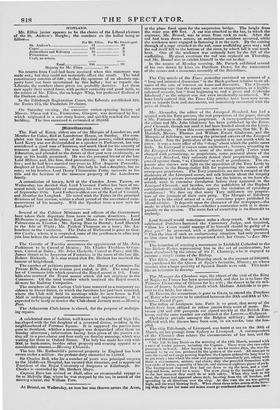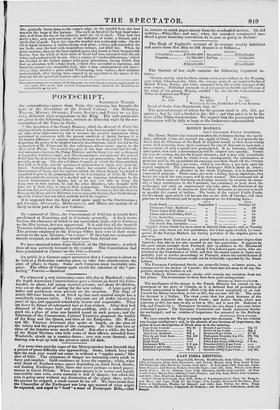The Messuper des Chanibres says, the object of the visit
of the King of Naples to France has been accomplished, and that he is to have the Princess Clementine of Orleans for his wife; the dower to be six mil- lions of francs, besides the jewels which Madame Adelaide is to pre- sent to the bride, her niece. M. Deneux, the accoucheur, is gone to Gratz, to attend the Dutchess of Berry who expects to be confined between the 20th and 30th of Oc- tober.—Freirch Paper. The influx of foreigners into Paris is so great, that many of the hotels have been obliged to refuse guests from want of room. Be- tween 530 and 600 passports are signed weekly at the British Em- bassy, and the same number are exhibited at the Louvre. —Galignani. Optlialmia prevails amongst the Belgian military; 300 soldiers afflicted with the disease have been sent, in six weeks, into the hos- pital. The ship Edinburgh, of Liverpool, was burnt at sea on the 30th of March, on her passage from Sydney to Liverpool. A correspondent of the Chronicle thus relates the circumstances of her loss, and the escape of the crew- " She left Sydney Roads on the morning of the 18th March, manned with a cre.v of twelve persons, including the Captain. There were also two cabin passengers on board. After haviog been at sea for twelve days, she was dis- covered to be on tire, produced by the ignition of the wool. All attempts to save the vessel and cargo proving hopeless, the Captain ordered the long-boat. to be got ready; into which the crew and passengers immediately got, taking with them a chronometer, sextant, and chart; they also provided themselves with two casks of water, a quantity of biscuit, and sixteen or eighteen pieces of pork. The foretop-mast stay-sail they had cut down to rig the boat, and a stud diug.sail boom, served for a mast. The crew clung to the burning vessel up to the last moment they could do so with safety. When they took to the boat, the dames had appeared above deck, bursting from the aft hatches, and spreading in all directions over the ship. At this time the sea was getting high, and the wind blowing fresh. When about three miles astern of the burn- ing ship, they saw her main and mizen masts go overboard about the same tun:. She gradually burnt down to the water's edge, as she receded from the boat towards the verge of the horizon. The crew on board of the boat fared toler- ably well from the day of the calamity until the 3r1 of April. They had two =eats a day, each meal consisting of one half-pint of water, a biscuit, and a small slice of pork. Up to this time the weather was moderately calm. On the 3.1 of April, however, a sudden change took place, a heavy gale succeeded, the sea broke over the boat with tremendous violence, and filled her. When, by great exertion, they got the boat righted again, they found, to their inexpressible regret, that the whole of their stock of bread had been saturated with the salt water, and rendered unfit for use. After a variety of hairbreadth escapes,' which are detailed in the Sydney papers with great minuteness, during which they bad an adventure with a huge shark, (which they succeeded in capturing, and found its carcase very acceptable food, after a long confinement to salt provi- sions,) they reached a place called Woolorigong, near Sydney, their numbers undiminished, after having been exposed in an open boat to the mercy of the elements for the period of fourteen and a half days."



























 Previous page
Previous page